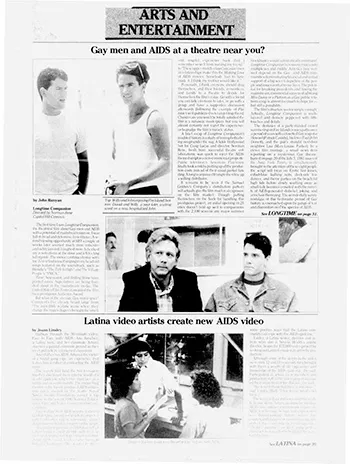
Dive into the archives of the SGN at https://issuu.com/sgn.org
SEATTLE GAY NEWS
VOLUME 17, ISSUE 21
May 25, 1990
LONGTIME COMPANION
Directed by Norman Rene
Capitol Hill Cinemas
The first time I saw Longtime Companion, the theatrical film about Gay men and AIDS with a potential of mainstream success, I was full of dread and defensive. I cried twice. A second viewing opportunity at SIFF a couple of weeks later seemed much more cohesive and richly layered. I laughed more. I checked my reservations at the door and left feeling full of pride. The movie continues to stay with me. I even find myself singing in my head old songs featured on the soundtrack, such as Blondie's "The Tide Is High" and The Village People's "YMCA."
Time, Newsweek, and Rolling Stone have printed raves. Superlatives are being bandied about in the mainstream media. The United States Film Festival awarded the film their prestigious Audience Award.
But what of the average Gay movie-goer? Comments I've already heard range from "The incredibly realistic scene where they change the man's diaper's brought the smell and hospital experience back that I remember so well from nursing my friend," to "These upper-middle class Caucasian men in relationships make this the Making Love of AIDS movies. Somebody had to have made it. I think my mother would like it." [...]
Longtime Companion's cross-over success to multiplexes and middle America may very well depend on the Gay and AIDS communities demonstrating financial and verbal support of a big screen depiction of the people and issues central to our lives.[...]
The destinies of a party-minded crowd summering on Fire Island crosses paths over a period of years with a closeted Gay soap-star Howard (Patrick Cassidy), his lover Paul (John Dorsett), and the pair's straight next-door neighbor Lisa (Mary-Louise Parker). In a clever film montage, a small news item reporting on a mysterious Gay disease, buried on page 20 of the July 3, 1981 issues of the New York Times, is simultaneously brought to the attention of these eight people the script will focus on. Erotic first kisses, cobalt-blue bathing suits, deck-side tea-dances, and theme parties on the beach hit high tide before slowly washing away as small-talk becomes crowded with the novelty of AIDS-generated disbelief, joking, and armchair theorizing. The wonderfully sunny nostalgia of this hedonistic period of Gay history is encroached upon by pangs of fear and discomfort over the spector [sic] of AIDS.
In the first of an on-going series of yearly jumps forward by the script to emphasize ever-changing reactions to the impact of AIDS, John (Dermot Mulroney) is the first of our group to be diagnosed. The stage is set for three couples, David and Sean (Bruce Davison and Mark Lamos), Fuzzy and Willy (Stephen Caffey and Campbell Scott), and Howard and Paul, and Lisa, to come face to face with AIDS. Learning to care for – and let go of – each other in new ways follows.
[Screenwriter Craig] Lucas and [Director Norman] Rene's handling of AIDS is sensitive but methodically diligent. The camera shies away from exploitation and sensationalism while documenting procedures. Varying stages of treatments and care-taking accompany detailing of pneumocystis, AIDS dementia, and Kaposi's sarcoma. Phases of griefwork – shock, denial, anger, sadness, acceptance, reconstruction – are grappled with. Peaks and valleys of emotion bring us up and down, though with plenty of distractions to enable us to detach and diffuse being overwhelmed. [...]
With rumors of And the Band Played On and The Normal Heart being tentatively filmed, plus the film Silence=Death (mentioned hastily, without details, in a recent Variety), Longtime Companion is perhaps only the tip of the mainstream movie iceberg. More political, angry, sexual, integrated, and impassioned films can follow in Longtime Companion's wake – if the film is considered successful and profitable. Perhaps the time has come for AIDS and homosexuality to break out of their celluloid closets with a new genre of films repeating the socially conscious success of all those Vietnam War movies. Except where those films look back with the relative comfort of time and distance, the volatile story of AIDS and Gay/Lesbian civil rights continues being in somebody's face.
Longtime Companion compassionately gives us a perspective on how our attitudes towards living and dying with AIDS are evolving, that the Gay community is comprised of fighters and survivors, and that we are an increasingly visible and vital part of the world.
This article was edited for length. To view the article in full, visit Washington Digital Newspapers

